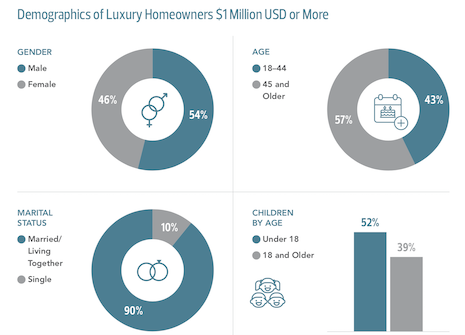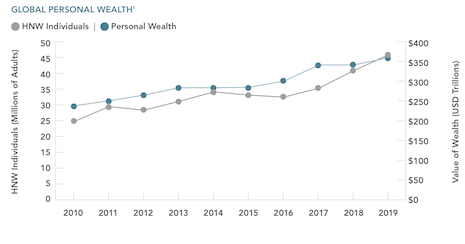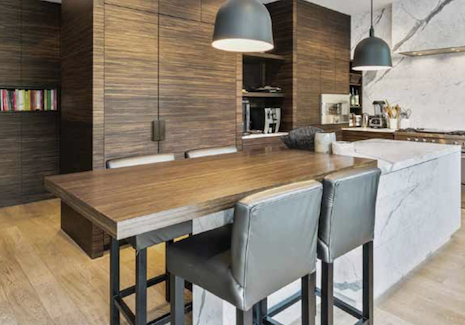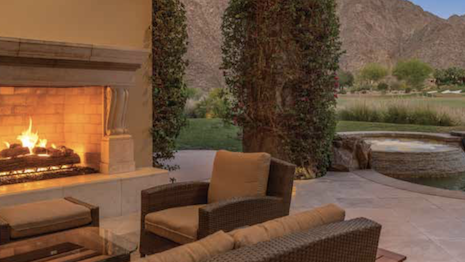Affluent consumers are looking for homes that offer sanctuaries of health and vitality, investing in real estate with wellness amenities and services.
These findings from “The Great Wellness Surge: Bringing the Best Life Home,” a new report from Luxury Portfolio International in collaboration with YouGov Affluent Perspective, estimated that wellness will become a $4.2 trillion industry for the next generation of high-end homebuyers. This sector will grow at 2x the rate of the global economy.
“Wellness is emerging as an important role in real estate, because the home is a central component of a life well-lived," said Stephanie Anton, president of Luxury Portfolio, Chicago.
"Wellness is more than just physical and especially now, as buyers around the world are facing both economic and political uncertainty with the impact of COVID-19, upcoming elections, climate change and more, we’ve found that a focus on wellness helps 48 percent of luxury homeowners to tune out the noise of day-to-day life,” she said.
“The results from this latest study are extremely compelling, showing a seismic shift in how consumers view their properties: not just home-sites adorned with designer finishes and furnishings, but havens that cater to mental and physical wellbeing. The subsequent ripple effect as it relates to holistic amenities and technology is far-reaching.”
Luxury Portfolio is the marketing arm of the Leading Real Estate Companies of the World representing independent luxury real estate brokers.
 Demographics of luxury homeowners $1 million or more. Image credit: Luxury Portfolio International
Demographics of luxury homeowners $1 million or more. Image credit: Luxury Portfolio International
Personal wellness spend
Since 2010, the number of individuals reporting a net worth of more than $1 million is now approaching 47 million people when there were only 24.5 million millionaires, a 91 percent increase.
The total value of personal wealth globally has surpassed $360 trillion. The report found that this massive growth in global wealth will likely be spent on personal wellness.
The research found that 72 percent of luxury homeowners say wellness is important because it contributes to their overall happiness.
While this audience will certainly have less wealth in the aftermath of the coronavirus outbreak and resultant lockdowns, it is still likely that investing in turning homes into places of health and wellness will be even more appealing.
The report found that people are more interested in wellness-oriented services, amenities and features that can help them have healthier bodies and minds.
"Following the recession of the late-2000s, the affluent are prioritizing luxury goods that add value to their lives over luxuries purchased for prestige," Ms. Anton said.
"Findings from our report confirm that luxury homeowners consider wellness important. Ninety percent indicated that their personal wellness is very important to them and 72 percent believe that wellness contributes to their overall happiness."
 Global personal wealth. Image credit: Luxury Portfolio International
Global personal wealth. Image credit: Luxury Portfolio International
Wellness real estate trends
The report identified five key wellness-oriented trends that are predicted to impact the purchasing decisions of homebuyers in the time ahead.
To wit: Wellness is central to a well-lived life. Home wellness is in growing demand. Wellness through intentional travel is gaining momentum. Total wellness includes mind, body and soul. And wellness is key to managing the stress of success.
Hashtags such as #relax, #selfcare and #liveyourbestlife abound on social media. A Google search turns up 2 million podcasts with thousands focused on health and well-being.
Seventy-eight percent of luxury homeowners use social media and 42 percent listen to podcasts. Sixty percent said personal wellness is extremely important and 31 percent said it was very important.
“Globally, affluent consumers are focusing on wellness as a way to build fulfillment and happiness in their life,” the report said. “After so much effort in striving, chasing and working toward success, they find they need ways to build up their own resilience.”
 Brussels Belgium luxury home. Image credit: Luxury Portfolio International
Brussels Belgium luxury home. Image credit: Luxury Portfolio International
Home wellness
Luxury real estate projects featuring a focus on wellness offerings are on the rise more so than other luxury real estate projects.
Wellness at home features include elements such as humidity controlled cabinets, storage for root vegetables, meditation spaces, exercise rooms, home spas or saunas, special lighting for sleep hygiene, and air and water filtration systems.
These offerings can be found in both residential and commercial/institutional developments including master-planned communities, multifamily housing, urban districts and mixed-use projects, resort and spa-based real estate and others.
Urban mixed-use areas are driving much of the wellness real estate boom, particularly attracting younger consumers looking for healthier lifestyles.
For instance, 47 percent of millennials seek a car-free urban life. Many of these consumers seek self-care amenities at home.
Baby boomers are also interested in wellness real estate offerings, with downsizing to socially focused communities being a priority. These home purchases instill social wellness, which 34 percent report is a focus in their lives.
"Consumers aren’t merely interested in luxury goods simply because they’re luxury, they choose to purchase goods that they believe will add value to their lives," Ms. Anton said. "Instead of merely emphasizing the features of a home or good, persuade potential buyers by highlighting how those features improve quality of life.
"They also want convenience," she said. "What wellness amenities and gadgets can exist in the home, rather than requiring a visit to a gym or spa? These are the types of products the affluent want to see marketed."
Stress reduction
The report revealed that total wellness includes mind, body and soul and this outlook is becoming part of real estate decision making.
Some 90 percent of luxury homeowners are focused on having a healthy body through exercise, abstaining from alcohol and smoking, and regular doctor visits.
Additionally, 68 percent of luxury homeowners follow non-traditional diets that limit processed foods and focus on farm-raised meats and low-carb options.
Stress management is a fundamental reason that luxury homebuyers are focused on wellness.
“Success itself can be stressful," Ms. Anton said.
"Half of respondents indicated that they prioritized work over their personal life, and money alone can’t alleviate this stress," she said.
"In fact, over half of respondents in our report found that wealth itself can be stressful. That’s where the value of wellness comes in, both by alleviating stress and making the most of the free time that the wealthy do have."
{"ct":"+akXe1RCKZDtX+Vxv5B1oWR0Scc3TxjEZp1FEM8i\/6tTpetUZ1vdoppQlaw3vcSTFNVzynwPbz9+fAWVIESLQqCesbDIHVBKhs6VAYukMA0O94G7BQ1iOo5H3t1q0CaMebzca5o18+Z4DT4SNeU9bXk4JcXG\/FYhM3SuN24CM8GJCf3\/xfn\/Io3ZxiWBRuQU76v1WKrB\/XlVDN2SWuPNJX64H8UFQC79LTrewJSW9bGAaQPBoH\/f\/W5jDpQksNVqs5YcDPOiGg6sY5orks4AIyqWyXDBRhhZKLGIyy4WWcuHJUMcvuIp\/46Sppz0X4vU\/3e3bCw38ZR5cwEjP718T9ZSufxLdngK2acs2NEG1FWaGbZKWwVPQgBvX+CDTTUSApO1VHvQovvGr7C4NROM0sL\/Xv1j+tbzXSoMOU0U5j3Tjiaz1qokVp4ZoR\/\/zaYBl4pjWaJ2im\/aJWbFlNiTXCcm+N+7nq86fZZa8VfR+Ba1EwGYF3S58ZCewu\/HTacNBUx4FVMYj02DrPXVMXxpjvLh9dVvs5QcwCG4Ywz6jOrMcWeH3paZvd\/UQInkHr\/H5ryVpzsjG3llbu+zc3jGkcmuupdbgIExo8eJJuXnxgNgL83p9N4JmWD3Or10dvhv97CDAClFOtD6wsTcZ5wrxC+ja2GSRs0CdAKsespa2GpxQWr+Ww7lMvh1nMK6+YefAWgHEmTLZJyvoUvi6lYkXKEiCwjb1Ry55YCyXBlPmhx5TVpZXZD\/\/c9\/8fTE3\/e4h2qKzwc6UPBs8gVbOuN4QYU9rNeWNMSudB0bTkCO7EQtlbtbLaUv1WhuFkaohbuGvWjQwJxeHmwaZbyjpMt8UzX2Twz0wAddEXLKPbzhM9X8+Xyca8qNb2hmduQd1hf9+ROBnLd0vqpEPjwQ+6mS2fwOJdFXcp0UvpGTiwtFa+VujDoM2a25Q+sODZ57lIGZQ6rtPEZxfL95NciS00yNkPOlbqzyI5EzEToA0rf51a2SiLo1jgMt2mtjLtMyYMz9KkfyUit86ZNAwgFP7YJYH\/LSOvQ8dKVYX+TDH+tOyBCNt48su54Kh8C4vEbPo2k4sR8oEejUbBVpDDtcT3hWChc9W+Tys2slNPoQT4zaI4LfQB9aprWb53GTQ0DDUdr8fFsxYDglsf4X74n0061sa0zuMuTKji\/MuKmDMSWzXbAvutEQzYkzhPLb+xav0FjnFeeqTsqQKWiMyvwYSfo2zi5\/tjLiypbT2AWhOljK1YSQTLoSF0NgDm1mHsm0PUgp6nVlg1ACRV98YU6FUBNH6oTLntkW\/28aBHFA7lxI\/8TXbwqc2yS4L7MXQBwcNStYaCS9ChMg24v4ZIimZPIXaAXEUX2FMMSzoNQdtlRw6StOMLSOymn1qBu34AXmttHjuqeom9oPKWbXTr92XVDdEL+C1I9juVrdpqCjEcLRYsN4PdlTESOGbYvdukod\/40Qt6VjPgMZgNN4TCCgn1Jbrf3MyCXIFCpANYozDZe8EC8keBYe4mk1Dg9F5BxL2grs6VGyN2+uoyDA\/09Zz3o0MyPbUaz5D4YhnNEqrLFcPiOtljy4g2T4LVJ5pwKeG2Zx0JLZBIjUwOE6aHSuyR3zECE6WkboqlcCO7eLsQhdNDWNLIsXgQtTtsuYgN0h7OHBj7yYnZeJOtbYJ7bUfrChklGorZQTSKR7a6Yizwo4dZ2J36SFhUH2PRMKIJ22n+BMLL0JgI678c7340XQfZP8s4icIzcu\/aRMIk7gYmythZjGCGdrDR820SniPYSP8\/QSR+up2PcMCCgJRPvBWVlMHcO1RHyYLOMOqe9sv0JSBGViDxqQ5V+iK36LZSRpXXsPEqgF2dqGqqfID6G3aVPGK9VFs32Y4NYVtaUnJNw5p2DmagFs15tB9qqMGUeJ0I8iLdshYFAibQlQNWhPxZH05JIIEW9g2XlR\/kJXiip\/1DovBs8npp2dgJyuYqpNTcbvKUAzG0\/Pm\/in3jJMf\/0arIm2bfKstRexfq1bzNPTvjMx9KTM1P+SZbVKAsHMOaV6BnHw6ypzD3+ebh9VAN9jRGeETcooal5f5Qnj+\/kWDRTYBzs67SMwGwSbStlvYmXH9s\/i5Sslr9S0MT+2BQeJDX1onNo8b5fjVOKv0VqRgIZ41peTDgtkzlQe9FY0k6kdE5VFZTmik3qBWzwnJwOckDKSblKEA47xEmT3cRRasJeLHvUwhw80O8FeZMY1rFlQyYPqCwX6deRQxSGyRRGMUR+FsTZ32oUDK0toDHObLsN7XSuGBzPWCe5wVNZIPwauQQhNhuhJTaPUefzWpzUtYPd6whe7aVJsiQ\/n7Iv7QK4NVdHt0SGHrH7rDswwJ6eInadS7bAY+3XMOGeLv48WUq+yyQU9by2Yqxj9pPICpbXpivGvHqWs0etviUd1CpiDN+6mhJnf4fIdFaYKcOby9DcPEYk+f96EtaXovY0k3AROVvTpXHj\/KRzrERRtoxxvNaKkivuCig1ENrk8hDcD67S4eqcsM++6TRELgAKW\/MCC5sHLeLWKRmTtqE0FT1fdBqrnyJ1UiDnSLTHthjKxkwoFaDoku5p0RHhM448g9H50GfIdWDdKQQC\/uvGQ8WWkjCHzOc4x+CqMJs5Fcldi224l03roWKT6M0SPNL6Fn408fGoDEJcrFJ1TOmK3AbomLx5RhmXHhOWY26h+8vdxvLid4YujyVnNUyB6OcQvet7vcrUAziFnanUdySgvyYIh4ZpnM7iHf8kvHUd2vHBvyV4TknChxCUpprXDXEBLxHIR1ViAf\/4qhrfoNUfHtCOhJwfyx\/MCxZonCiezXIhBJLa7zvvfspb7xMwgi+hbzkzdep4vMYeZ1WCySgi5D7woqyK1iUX+iuEuIig6BUYWQt0qJ7KUZ1bFwmipRACD6NVT6ho2TXteaKPO5P1FkLp0gKnxJ25Xc\/ocxDs\/6riHVArLOxpgW51p4ywxPopueb\/6bS+5+RlA8Its0BayBjFZbuslJSWULXdlxuON7cMJCWQ+wPmX8F0OLYnku5+9XlDYfYIoq6OQA1LF9jwEal2kkWsZTvK2jcPCl17QAs1we0CTR7pTwoY31eMAZRv1vXR5yoOmkxDP8yHmnrakjso04EcVHELUz7cv2B8eJzfYQfH4tBmP6p\/NNekujIJ5g96PqHX\/w48fvVymgx4IZPrLOVCiKeTiiS22gSkodDTQLi\/DBLOayqYLIJ3Pb+qFiK0XgPv3D3\/4y8XrA0GvFgbs7XDWJgRFjMg\/5nUkeyvs+RHwlEL4a9\/H2rVLtOP1bvpXwAmKyysIhwPE9UuxCFg\/YMN9DVEoHhXqj7w3v0lmpT7s7Do4MsK8S\/+1h1WP25qjPBs6KCsxcLuQzCp+yNg6sPWwDoDSVctJ0SMAauEh3SKZSz+wWuJxioJQxu9vLT9j2aB94uqkjfP5hiVAmyILkAwJndtxvx9dFckHpDgq8FZ8B46fXBgCGL\/RVnnla2SqhBf3FfzCSmKmuPJBpJv+7XjgMV0DOx8hD+vq9F+PCZvaN9Aw44Oj18xZ99T6LPzts62n\/36xtcZNwRHF2KmKK32eBulXU5mu7jujwIlRSSGGV7mTjf0KAxANv2KhwuYREA1hoOw8wL3SnhHT\/KFq1AI6xezFk3gYXR+qh5cZGPDhFgKSBPG+VLkdDQsekOQPDHKQt0cdZHFftLB1cdNHJRi0qfvNKYLpTfKla0XeHk83rboCzQCBm7T+mxTmnM\/VvXpbHJiB7hNwduLwJN\/Z6xb1Y6cuCyl+rSRe0nJNlbr+MGvGkvKJT8Z5lRb6ZCiAyvXWLiwx+RvdEu5HI4VjYUmUT\/Tpxg8I0JIUGddqmKb+gqPc7uRY53tcO+C1CND2dQukKmVb3j4SM1KxtMaUelswz8CQ08JvFjaMYJaP9wgFTQn\/CC+pnes9D73Aiuzt\/H\/YTkfgYa\/a6p64RfbLk4acejANU6idg5UswQPF7XLmz9V5pMOu6R\/+Z+gS6KqzB3VFtDWjbMk\/vmblgd5UL0SqcSYVUODnsjIUA4GB+JmGt9kJoaBi2nfT6DMusXV2+u7TglhGS51Ooh4QDThQi2ZvakPfw\/gSt4QutfhiqbwJAN+I+hN+JnHUERa42fwjYjsXqLYK4QQoyQ6VnEG7EZceFBQhju7I+ZCm5EDT452IJtAEEAXxVWBNvOHhNhmo+aMjLTCSeJieb48PuHnuzdX4TC4tYwuYHbEeNpJ8k9J2HSh\/Gxe47g1UM0plBeVh7nfHM9wG4Re09qumKstOuYOm\/JGTpijBfLOXRJKSFUGDcn9ow9k5LEFa9a41X29d\/51SvidRD\/84OJQGM7+dTtThPDatZJ2uozH4DcCq5exEXnMdYcRfnE2wDUnxa0x+j2mLLWMhquLswVvJ3zJFP76\/3uDH9gkWCfZajFToFE\/i72x8JBykSIzFQbCNNnKhxmAtIL1fiC\/9eiwUvRPJT\/305Jd\/4VHgjfpxA2T\/mkzfW6zwxjzsYGnx2CsX5005V26FAzVRcu3ujBGn++USl7uaQQZAHjdyjyiqSHEmdVJpFH00EKENWB5bSRfktc5sGKfSSPb+TcvhYWrrm+iYczfo2TUOhf7F8CDPdmd2sgulSJoIBIT3ESmLqdSVi5JywTUJHA3ieYB0TrD5V8LHqwXqkOs5JHu7HS+YAriCRombwk8rgRNYd46YjWsfg5x6XkCerts1jX\/PXFP71Lafpg0vjoqvvhPQqqRnHJFws4n4cdLMd0T2KZcsQJOHmu9wYu6U3HQ8VFsabwAJikW\/UnQfV6kmu9AzAHx1UUYVHIfcfFO\/Ndgi1eFJnm4TkHAWI440stNxAzJXgfEfDQ6mIncMROx3jT2gmrAQi7hzsU3Wc1zfy0j\/uUKyCHUVFiCmTphYSDCnGS0kjQsHvBySjlhN88LQj3+jYKqJSFZ7szShzDw2fMvGX6JmJxl0caSZsvhoO58\/RWs8H1GP1YzMwKwCN1ukqsens0Ny\/4PDoK+GgRfgFVntxyMlWO2k\/OBwUQGlHwEhPJJaNISSOL1x6uO6vBddT68Ge3zaLmb0NP2w24cg7rEpUK2rpjFPh2\/b4IrqhgpdPdA8T5exKBoS+I70P7X5suGJH+QQNbLwctu+g3\/jV09oFH44A1FzzcS\/2PUiksaX33CLsW\/b444o5tVAgUQe5hYrHuLoJFTTLvOr0uYitun3dUMNdifWP27KSBtx4GLBYe1xtALavuqFWa3ge+1UTEGzs\/eUevfTAUFMShv0ULhOAxNNURSKcYhfcPYm1tAcCeQmEAerVODluOEw7dmrTZdbyhG1oDXvyYmjVTjhF3DxrufxN7Y3xsAw4dZfN+LZ1qOhHbQZj0aiXtvyyYywUw8E3Q86vKUNq73xQzHCCwSjJoY2LACFTJTxtGi4wYSyivwRYMAtdrfnsJ7fRjjseK0kIguBGc+gJCvRRXiPqK5lAZLEuKIc+hF+BKUiw8AmkCEKMoAYtmAwcWkTVY2NEGcxYX3p\/2YSSa7bxPE5wMxSiBbX7GnDeCUZ6YmpY0FgG4u4ROaIhK0LDuavMMPzqrpudJ8I4DHuyT\/Oyv8shAnXBK+IiX9kD5dXUrh5BDCDvEGMak6GMBhgmVCwuOHnkl9bJ3qYtLspDM2W49P+\/9O5DvjhaOcztXQyAvtqK8ayvNAFD07RGNGJWmc8lQlY364t7oS+jCiqOw3ELikoEUzPAVjkzCwUO2xk2ICtbk73ack8m3zSMVxCYPyzX\/L6yZBkuz1Y4yYyqVZEqXpC1GYkpngqAiPhNDorTl5jHqQ78RsdO5hy2WV+JLC+Z3DH5RxwZTBYto8\/CfeiB7ULajyyrQ939X2t4jfMtSf9G1R3C7EsKW\/pYqs2x9k0q2YBKgl1H0O+kpTnGnLAzC2ToXeYgn\/c92eYRJY9zy9wDtFtAin5vAJqjy2JffAmMa\/lQQo5XX1NZuv\/vWW1HjMBMlVUsArCwicwrn7VSsGrC9BOvOY9UCrpPoF2MtN1nwkYVlETyQQ4JgJWleTdAAcm4roe4jLUczQVnfb5oxIafneA1MgWtBHJaYcdETyLoiR46Il9h74UUVzl\/OT3BAB4dx5SoBeH1r5nPWgxFH\/G1G9k\/9BPUrdgpkmeY1s26VYZTSF+7cD+OH7npmw61KnveWjoMp7YAADnZRC9JFVcWiMkm6LAxnvmvqu5MvJjURdD1EOUlJ4pj9IsLu2ieHWGx8DbfaMrBROsS2+bKdxxIlU7+t5BZ23dSx\/dZypwvYCQmBR4fyDuo\/v44PZgvVHhctBJ5Qr0M\/JtqfCw+7j8LHHxhQJV+dqGPGoGzhjJHBY7MGd9eNhcyJUxx9HXnuQ25eGQN48Jogl\/5p1nQmPN\/hl2IgfcAJ1W8XztGT4zzPelZqHCSO6y4DFWdkHznsC1YkWzO0EBNKKlbxjrc4AoivsX3oStRU8ZrmvDTlJr1TMXGDFakOFE8vuvbw2KNnJ4RJS+D8GtTJdz1pVsg7AIHqT7qFqFwO0NJfGoSlTmastH\/MRfZNo5uPq37wnMV++scLy4zE8ejYvwMUjWe4X6Xsypr\/obrGOrEIU4Aq0VRwf9WT3ExDj2zMJVrHDmj2aSB6DMGd6h4q+FEM5Ly5VBenNB1kD8PsFmZJ50985sjm9q5wyy+4hJt0PbFZia5ZHMkBa667Snjpz6iWomB93k4LocKA1x01eIfQk2IE5KivyvAv1tkj2q0BMzR6\/UagjyzAHHBR67cg3PfXRFmnfnlPipFH7Yo2DLo5eLgtbe2FUv1nInPAoMmt9tTge3Uj22neAwSmPMxxqRFSjXq+I81yrVprdpAcH7jN\/7n0ijRCscmMEPUki0ifxrVYclHNgrcXzacgC\/D7iTPocajyVx\/26gPYUSo2A2AKs9OWdyuLtmvRtGN+6jDtrJtFCNZhkZFTI8OqBFeBHl0GsDlM6YJN3cLAObIuE+xgepcqaKid8A+dkJvZZ0ifXfO8zQxnYrQLmtYPDH5tmqvwRj89aBSsFCz+Iqn6I3xChlRlqLgvKDDEU4AllTe5l97zi5iWhnPvRSVTluKFMAP6ByBOSXvTLWzx2iyaHxfNxGJokcLX5Gb7UKWYz6+Xkw7aalfeKYqrKDTLFaYI8WMbRuQWmD2VEuW7LLn16aF\/SZ\/Q2F3XItFwby1DaIkurqPhuNRR2mP5rEsaYheRvoK9Bh7sbxjXrGPgD790TXHCmlXPkz+y+j9yNfvUvUPwI2Lgurs\/jKcPCDnm31wuQu6Wlk\/vz9w12BdFqlrvndlaqRWDmJ+XMxLc7o7SnKxGKrRi2B7uWsqzEmDTweeXlHPubLUK1Y+YHb1EhVRLlHy8eIhO8znDiSjSpyUibU\/AmpsuPcDyrtmElXbsJ+\/9BhXsybqjSAfmAHdSLjj9TWDXIWrOHsqTO093knXogGb0L0z5oupySbmtlP2cxXoInM4wzjIQWe9B2Tjn3Qi6PQ+BBvCIf3tsVwz6PHridypXVPXFup4B4FJE1NsnSiEmM3fpWcpB1aV6eF\/BiXjgghsxwNHJReHuHGxCImHle50IwoaLJQP9NqBcduWZMK2Pa80w6aFiLmYrHspPan0cMqzeuG8yeOFCibvqKtZTaL9pg\/YLnWE7N74wW24krHK3KWUqEF5FoBwd31AOu0AqPwFmRhEJzWH9mhdM+5bDdOlrKokrXJzffyFZkaKLS5UHuLvs2EPiBjP2lBTS4aarj+5htWWTqp2Ky9GvdCBCqA0rtSCsoUBbiDvRF8KXRnd6QALj1M1mIYd+FkAYBM4YrslVO94Au1x8ME6wnQuQME63PafMsVk1\/RcjjBNRkSp17g9sgIdxQhKu3T7lckMbDRKf8YXmb2rWkwO4bhHIv8Xuj0wrIKvSFLJcprStzbfMV7Sx2oXpYrXboTDbLbcnPMAoYRnfuerZl1H2aLm7YZdzjiUf\/PoACW3t31IGyUQ7u5sZ4amChiqK+7RC0exHANz0vGy+G4p0zDPFCn71oFPrHFM2mt479QTnHn+P3g362d\/C22oMmSRwGzoQ6Ot3iLrE9sJjPR55NOUo3fdwGAZj5OY97qv4QyNHmU\/Tpj46PQhqOr6zwerE7787V7wFEppvKZAP1Dy8Q5+eIRg9w0Pao\/MWCIICGr6WSUVEo6V46QVjPdAV9PItAKISyB1pTOl7Cxwhrb58XMugoYkI7KnLT5VQZZWTE4yLYJT+RhcxZmlVfJSDQuZTcsqFcfDLoLuBZe1uyJt2d9WefuyqSDMYRnk0ZV+1V\/Pb5v4+GskfuG3sGeyajXnNLQdM0zRKTgpzrd\/BnHBs7oIByNqHPkkhjXYZq8a7ZXKxjh8bXqpM2fE\/EoT9lCRMmwe9U+KIGGr54OS2\/eb4vDyNES8qoL4dfgof5lIec+v8ToHuI0MVsgyOg6EZouIHrEUBawPsA8D4+uYzJUhF5iPR3S97xF+2gGx2pBq2TZAjrIL\/o1TgWE6BvxbIyJUvYm9j6J0GNeD7\/KG8HXb\/QmKWEyqU83OemW7ykfv33w4Qcb3dSjMr9mqP22+ibqICMLIlwlQqQv7LhK0+QP3JQnXcYsWXEJLX6UzWKrWr2lMQp78UTa+oxI7Qpt0eU01uZqVcXvzfmi5abjOKcVKxJPJkDMquBQS2\/mq2e+1f3W3VhJWUdx3kyVYM+fqYg7Gv\/LniKzXJhdaTobWSzvzi0Iym1kPOhlgHo8FR7Qx45ppFWpZeHr+9s6YSTAjpkPpLkg2hRAscjFN8uRHRWUCBnmL7SE\/E0IPaE2bH6IfN1zVBr0ZBOn\/S+8PYXPKD0Mg6lCSXTvZndFdtsxN0GWexBPsk893pjNIfPeQRbLzmG2LqvnfdWTTMrV9t+p+5Q56AGLX9e4ndS0gwJnYl7XmE3dZpfe8RBNrnR\/oxvPupypLb6Z5BhmoPMxUztYzS3lc\/mPYU2lBYiJ0tMSg4pCeYI8HQWv0BMHRsYT9uUfimzN1X4BWEEs\/mDt+5tMNC2SmwUNaVp2otBY4yTIyM18ztnA3nkilXzE4pSJEjSxrysqjWVyphGDFwey0fUCpx3XDRdJQ4KCQMTXmgnASAzjMKDTBERXP\/7HTX+igxxjQBOLVRotGTRXaZ\/nZNtmWbeo5rQvQdARVmnH47\/cUjUbZtx8wddlcxI+\/vqODlZkxJrPBY+h11V2je1kFFZligmNmgK+qnq2O20JY9RFC1HXpPXtuEZYlv+3RT3YZmQO8rbQcptN2a8OA9vSBL1XpnM1H6T5+f\/3zk2TvkDGxBDhG7OdnTQndDZ4CW2L\/\/NydzFYjTlveBZBaQZ1i6C+LEpmsCOqNqJygcbK43HlIC51l2f79U2TczJAXUIPpv2rvv3xhYG1GxZj9cJyMIuOe8ZOJN0vsSlOrvyFDf0WsCo0YWMuruP\/QVkxL9pUYmAUvo2kBbGhCh4KtVZfG9ZTfvEAKz4UL3D3NDzGnKm2352sZD5rTFehT3z7zKeONbWhvny6JXiHWx+PErafbQVmnzxtLUu+8S80tOY66qletjTukYKacqbvW99w0Ej92okNzhWICLIv5pAAO+p5gjek0tMKMxqbIiBbnJ3490HLcfoGoTRiNdexSJGDLJgepzMT4q6I6557E6ECfXMfXnaz6xadYz3b1M8vVDvCzZo9UT1gNAIHb0pi3NGce\/AAtuXatHWT+Hq979jHjsiccQHU6xykuqH+EQcFxcD9yOyTAoKRUNL7KmhY2\/nFg7AiRlV\/TJuZLMGanoAWx3p+2v9J9S\/o5KABuU6sp9ehzIR9nFPRy6fryU5koUUR6iuLLQOlhE4zxSC26ELbF6OIF9Etym2aKjQsUyTE+lMqLBPIP0wi+T2ecXCEwGhVeqbuJ8jCiCO81IirW9oVqRwjmNCMlfycx7Z+YdnKID49PRjtxqqio+ynphs6G3FG7qSjMeqCp5KFLG174hAKceElhuN+qBHtbynsO1geHdkKxR7vwgvedS9CHWBkvoiD7KFncA5\/EcfMnBZA3hxBKJAnzqzz+ZCRQgdj4QfhIWe88A84xFWRiJ\/T+4hgKXq+ECddK46\/LzrAA5p3hAM1W1fNGlhv+e2ZgCwknG5nNDysumKUo62+5h76W5R9DftZof7cXHNPKloe46z1m43C5bxt9qGliL2Nd0MyB2gCqWc7cq\/OVa\/nNWV5qiP3h\/bMtO8nppWlUM3SmEIgqFCNQYC7PBazFNNEQiv+ANubrl0NqfWTOy3dCuQroo7VugvcYJVVK2WnVauIG\/TZCAFO8Cwik1\/FErhEjCLjOpVvFxCb54RMNBhp\/h\/3VnUzGgotmPnr63t9rO+BeQiTUGkDrpx6hVVSl9HI2DeiD\/pTXP8+Xs2\/LMQPd5aKjg6CXfopFHr6R\/OBo1Xmo0GIK1ynmVznbgpv6krA52NsD4aW1HixOq467gHBPY0G4bqiBpzXQ+gGV7NbMJ+hBUXEa9JmpsguMwJj23+UsPER0pdTCko0KMsRsoCWrP5FZDfpfWaZtPoFy6cP0\/xY10by+QKHbEEuOEdo8KgIugzl0mMVvU+tw9R7\/NLitcJ0Gkr\/BZREevah55ZEKZP38s0hIl513xWiwlq1mKd7h3MxMvL\/itleW9QSXgsiqXhH5DOB71keQhnzu\/JFH5s+lUERcZ5j5klF7uVTP8jlCECInNBTvy8ongP1dl3rR2mQ9YB3xYyFI8iTHVvyBgZVshGm78DxFVXaUtqy3gjmFO+FAcdWZpO0l6EaQQGdC7RpOYS6+ykQk\/Sa7F8NKAAv\/1eZ000rjRawcdmuG52fmjDxjfIlS522SDvh5zDaHS6ZRd4+NG+53WdiOjpligSzTmIXXh7rL\/ZNc0k\/FkyLNnuzqEOmaVzy7aLUf7K5l1gN91yyH0BiimrgAPLgtXbVRcmA2KnhPL351\/hjd0DyiscNAboP9uLZFChmaVG8hhXoo102j8QWbZX1GRer17x9mfPhR0T746f8xPkUW7ntFVlQADs1t3YW7ghU0EoRPY9qSCbN6H\/Gw5FKyMVrrnj5mcB+a+uSNGetuN45ITmLfxGVDrclkBOmvzsaw28zoTqvwnh+YArD5px1SaWFbFtHWrBGqwlmN4XRb9W3giH+th5V22BtAE2BmIYiuCDAy2UyZ3gZFPqoXfjyIgNTpKZnM81jv373+2pq32X5eLdmnbrEomTyFSCsSGDH57gxxjoCwCfH51wTWxs8thaszCo9bvVYrIwRRQX\/aahT5XUI2ESFQRdEd61+SnCo7otfG6RZA4ZyQT69SCRJ6CUA9WI4Oi+P8sOqAWZHH\/NB+A2tNMC4aHGGWt8VbKbDK6AehdWJny1eLo99wwm8inx01W3ukp+A51Uua5hNMD69Ien8Vv7Nn60O4hWkxYwlQqaDZf7Q\/tk9QWJouHB+O95FZb\/q4q\/yRj\/XAo15RxNUOQvXJj0xeRaBEch2hWGsNF31A75a22bmoHVOsXWzVdxflrnThO1s\/Ub0L\/gZ76CvACGjgjy9yjPRLCkJJGQQnpuERV6XnlyQuBzpyJPOVN4QTjUkdXdHk96MFLbuyu3E1ecKtku430PWM\/EAs+9CVYKTiZalMm23CpkpzmT+DctSy2ais1Ro9jG9QXoCz579QsPC212mTm4Q5gLQ\/J\/wcsT\/KvdsKfgVMWGXW2rZJtSyGGuWwlfDGzXn8\/p7ATjJCgNQGAYU27lE2OsmOE2CDz9Tnc+SIdzfTTyVgMYepq5IIpRAoad9g2V3rc3Z3ryZKT91jNkJ+lA44gHoqyFPX\/PMfzs1BYmEL2dhoA3plIFBoyYrTifu4tG1El3VDGk=","iv":"ac629459a0d61fd4c87400325504672c","s":"de8fc1f75c6c83ce"}

 La Quinta California luxury home. Image credit: Luxury Portfolio International
La Quinta California luxury home. Image credit: Luxury Portfolio International
 Demographics of luxury homeowners $1 million or more. Image credit: Luxury Portfolio International
Demographics of luxury homeowners $1 million or more. Image credit: Luxury Portfolio International Global personal wealth. Image credit: Luxury Portfolio International
Global personal wealth. Image credit: Luxury Portfolio International Brussels Belgium luxury home. Image credit: Luxury Portfolio International
Brussels Belgium luxury home. Image credit: Luxury Portfolio International